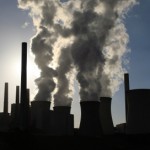Outsourcing Pollution
 Proponents of cap-and-trade ignore the possibility that it could actually hurt the environment, by forcing industry out of the United States to the developing world where lax environmental laws could allow unchecked pollution.
Proponents of cap-and-trade ignore the possibility that it could actually hurt the environment, by forcing industry out of the United States to the developing world where lax environmental laws could allow unchecked pollution.
Instituting a tax on energy probably isn't a good idea in a recession. Forgetting the economics, though, there is the possibility that cap and trade will actually hurt the environment. Case in point: steel production. The Wall Street Journal reported back in May that industry analysts expect the passage of cap and trade to cause steel production to get sent overseas:
integrated steel operations would move to developing nations such as Brazil... Set up abroad, they would essentially emit the same amount of carbon -- only without restrictions.
In other words, American factories would close down (sending more American workers to the unemployment line) and move to Brazil or China where they could continue to spew emissions. But Brazil and China have far fewer environmental laws beyond even the regulation of carbon. Relocated industry could thus take place with little regard for the surrounding environment, even in basic areas such as protecting the local water supply and proper disposal of wastes. Cap and trade just outsources pollution: moving it from the United States to the developing world where lax environmental laws exacerbate the problem.
But to dodge allegations of being a “party of no,” Republicans need to come up with solutions to environmental issues. The New Yorker documented an encounter between Mitt Romney and an independent voter in New Hampshire when he was running for President. The voter asked, point blank, "It's eighty degrees today. What are we going to do about global warming?" Romney went into a vague description of an America, under him, where “we’re going to get ourselves off foreign oil” by using the usual laundry list of “nuclear power, clean coal, more efficient vehicles” without offering much in the way of specifics. It’s hard to use those ideas to counter a clearly spelled out cap and trade bill.
What about proposing a plan that offers tax credits to polluters to invest in more efficient forms of production? Factories can be given credits to upgrade their machinery and facilities, or to retrofit their equipment to operate on natural gas instead of coal or oil. Power plants can be given tax credits to switch to cleaner burning fuels. For those who are averse to more government spending, the credits can perhaps be given out as loans which companies can pay back after they’ve made these investments. This solution won’t solve every environmental problem (neither will cap and trade), but it will make American industry more productive, and will lower carbon emissions in the process.
Cap and trade will attempt to reduce carbon emissions by tearing our industry down. A tax credit system will reduce carbon emissions by building industry up, investing in it so that it becomes more efficient and uses less energy.